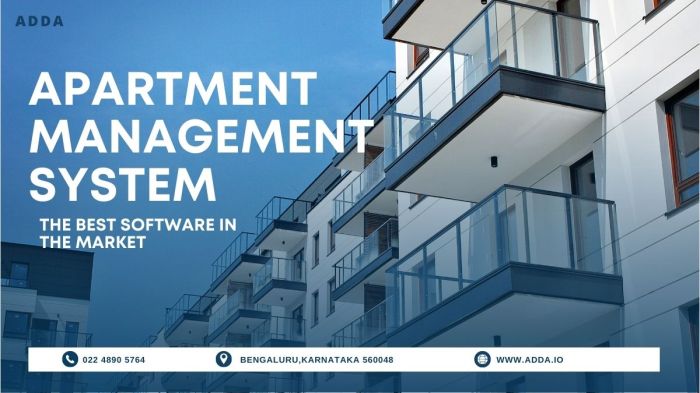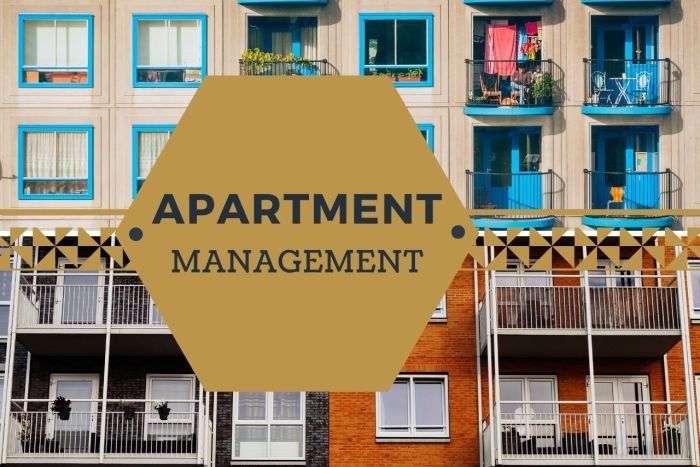Mastering Apartment Property Management: A Comprehensive Guide

Delving into the realm of apartment property management, this guide aims to shed light on the intricacies and nuances of overseeing residential properties. From tenant relations to legal compliance, every aspect plays a vital role in the seamless operation of apartment complexes.
Let's explore the multifaceted world of apartment property management together.
Overview of Apartment Property Management

Apartment property management involves overseeing the day-to-day operations of residential buildings, ensuring they run smoothly and efficiently. Property managers play a crucial role in maintaining the value of the property, keeping tenants satisfied, and maximizing the landlord's investment.
Key Responsibilities of Apartment Property Managers
- Leasing and Tenant Relations: Apartment property managers are responsible for finding and screening tenants, handling lease agreements, and addressing any tenant issues or concerns.
- Maintenance and Repairs: They oversee maintenance tasks, repairs, and renovations to ensure the property is well-maintained and in good condition.
- Financial Management: Property managers handle rent collection, budgeting, and financial reporting to ensure the property operates within budget and generates profit for the landlord.
- Legal Compliance: They must stay up-to-date on landlord-tenant laws and regulations to ensure the property remains in compliance with legal requirements.
- Marketing and Advertising: Property managers are responsible for marketing vacant units, conducting property showings, and attracting new tenants to the building.
Importance of Effective Property Management in Apartments
Effective property management is crucial for maintaining the value and profitability of apartment buildings. By ensuring proper maintenance, addressing tenant issues promptly, and managing finances efficiently, property managers contribute to a positive living experience for tenants and help landlords maximize their investment returns.
Essential Skills for Apartment Property Managers
Successful apartment property managers need to possess a diverse set of skills to effectively oversee and maintain properties, handle tenant relations, and ensure financial stability.
Property Maintenance
- Knowledge of building systems and maintenance procedures.
- Ability to assess and address maintenance issues promptly.
- Coordination of repairs and renovations to keep the property in top condition.
Tenant Relations
- Strong communication skills to interact with tenants professionally and address concerns.
- Conflict resolution skills to handle disputes and ensure a harmonious living environment.
- Understanding of tenant rights and legal obligations to maintain a positive landlord-tenant relationship.
Financial Management
- Ability to create and manage budgets effectively.
- Knowledge of rental market trends to set competitive rental rates.
- Experience in collecting rent, handling financial records, and managing expenses.
Marketing and Leasing
- Skills in advertising and marketing to attract potential tenants.
- Ability to conduct property showings and lease negotiations.
- Understanding of fair housing laws and regulations in the leasing process.
Tenant Relations and Communication

Building and maintaining positive relationships with tenants is crucial for successful apartment property management. Effective communication plays a key role in fostering these relationships, leading to tenant satisfaction and overall success in property management.
Importance of Positive Tenant Relationships
- Positive tenant relations can lead to higher tenant retention rates, reducing vacancy periods and turnover costs.
- Good relationships with tenants can result in timely rent payments and compliance with property rules and regulations.
- Happy tenants are more likely to recommend the property to others, contributing to a positive reputation and increased demand.
Strategies for Effective Communication
- Regularly communicate with tenants through various channels such as emails, newsletters, and in-person meetings to address concerns and updates.
- Listen actively to tenant feedback and concerns, showing empathy and a willingness to resolve issues promptly.
- Provide clear and detailed information regarding property policies, maintenance schedules, and emergency procedures to ensure transparency and trust.
Impact of Good Tenant Relations
- Enhanced tenant satisfaction leads to improved property reviews and ratings, attracting more potential tenants.
- Positive tenant relationships can result in fewer disputes and legal issues, saving time and resources for property managers.
- Increased tenant loyalty and retention contribute to a stable rental income stream and long-term success in property management.
Maintenance and Repairs in Apartment Properties
When managing apartment properties, one of the key responsibilities is ensuring that maintenance and repairs are carried out efficiently to maintain the property's condition and keep tenants satisfied.
Maintenance Tasks in Apartment Complexes
- Regular inspections of common areas, such as hallways, stairwells, and parking lots, to identify any issues.
- Landscaping maintenance, including mowing lawns, trimming bushes, and watering plants.
- HVAC system checks to ensure proper functioning and timely filter replacements.
- Appliance maintenance and repairs in individual units, such as fixing leaks or faulty electrical outlets.
Handling Repairs and Maintenance Requests
- Set up a streamlined process for tenants to submit maintenance requests, whether through an online portal, email, or phone.
- Track and prioritize requests based on urgency and impact on tenants' quality of life.
- Communicate with tenants promptly regarding the status of their maintenance requests and provide realistic timelines for completion.
- Ensure that qualified and reliable maintenance staff or contractors are available to address repair needs promptly.
Best Practices for Property Maintenance
- Implement a preventative maintenance schedule to address issues before they become major problems, saving time and money in the long run.
- Regularly inspect the property for potential safety hazards and address them promptly to ensure tenant safety.
- Keep accurate records of all maintenance and repairs conducted on the property for future reference and to track trends.
- Encourage open communication with tenants regarding maintenance concerns and provide avenues for feedback to improve overall property management.
Legal Compliance and Regulations
Apartment property managers must be well-versed in various legal aspects to ensure smooth operations and avoid potential legal issues.
Tenant Rights and Property Maintenance Regulations
It is crucial for apartment property managers to comply with regulations related to tenant rights and property maintenance to maintain a harmonious relationship with tenants and avoid legal repercussions.
- Regularly inspecting and maintaining the property to meet safety and health standards set by local authorities.
- Respecting tenant privacy rights and providing proper notice before entering the rented premises.
- Adhering to fair housing laws to prevent discrimination based on factors like race, gender, religion, or disability.
Consequences of Non-Compliance
Failure to comply with legal regulations can lead to serious legal issues for apartment property managers and owners.
-
Legal disputes with tenants resulting in costly litigation and potential fines.
-
Revocation of property management licenses due to repeated violations of regulations.
-
Damage to the reputation of the property management company, leading to loss of trust from tenants and potential clients.
Ultimate Conclusion
In conclusion, apartment property management is a dynamic field that requires a delicate balance of skills, communication, and legal knowledge. By prioritizing tenant relations, efficient maintenance, and adherence to regulations, property managers can ensure the success and longevity of their apartment properties.
Dive into the world of apartment property management and unlock the keys to effective property oversight.
FAQ Compilation
What are the common responsibilities of apartment property managers?
Apartment property managers are typically responsible for tasks such as tenant screening, rent collection, property maintenance, and resolving tenant issues.
How can effective tenant relations impact property management?
Positive relationships with tenants can lead to higher tenant satisfaction, lower turnover rates, and better overall property upkeep.
What legal aspects should apartment property managers be aware of?
Managers need to understand laws related to tenant rights, fair housing practices, lease agreements, and property maintenance standards.

